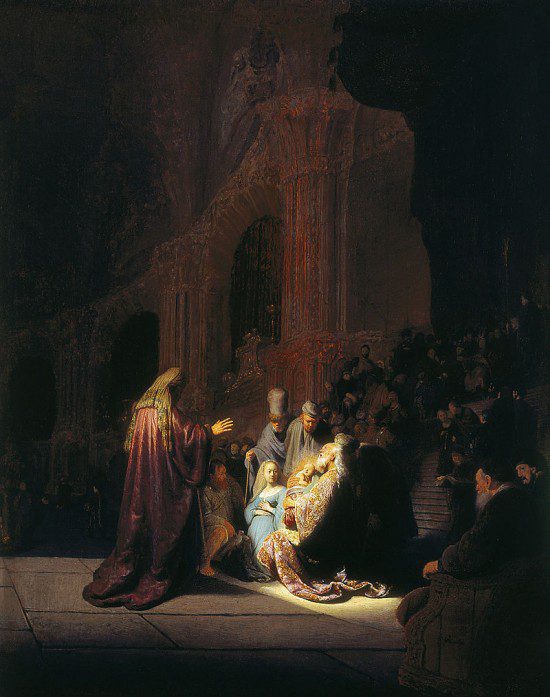Now that Lent is over, it’s back to life as usual. No more arduous efforts, no more talk of self-deprivation, no more trial and drama and spiritual angstiness. Yay for Fifty Days of Easter! Bring on the chocolate!
But let’s not waste our Lent. Recalling our spiritual history might help a bit. We usually remember that our Easter coincides with the Jewish Passover, but we may forget the parallels that continue in the following weeks. After the first Passover, the Israelites fled Egypt and traveled for fifty days, their journey culminating in a gathering around Mount Sinai where their God revealed himself and gave them the Law. Their Exodus was not just a release from slavery but a pilgrimage into a new identity defined by love and faithfulness to the One who had rescued them.
That sacred memory of the giving of the Torah/Law at Mount Sinai was later combined with the spring wheat harvest in one grand festival celebrated fifty days after Passover. Shavuot, also called Pentecost, or “fiftieth day,” defined the people of God as the recipients of both physical sustenance and spiritual reformation.
And so here we are in our fifty days of Easter, but all too often we regard the season as nothing more than a release from the ardures of Lent when it should be about the new identity we are receiving in this journey from our Passover, the Crucifixion-Resurrection event, to our Pentecost.
I call it “toggle-switch spirituality,” a spiritual on-off switch. We “accept Jesus,” and voila! we’re officially under grace and not law, we’re officially forgiven and saved, we’re officially going to heaven. And now, when we screw up, we can shrug our shoulders—meh, what do you expect? I’m nothing but a sinner, but I’m a forgiven sinner.
Now this reflection is not about guilting us into a better Christian life (whatever that means). This is about encouraging us to receive what we’re being offered. “Toggle-switch spirituality” is minimalist. It’s an insistence on nibbling on bread crusts when a banquet is spread before us.
Paul felt this frustration when he considered the plight of the Galatians. They just didn’t understand what they were being offered. In the face of freedom, they were choosing either license or legalism, unrestrained decadence or tedious rule-keeping. Either way, you’re missing the whole point, he seems to write.
Part of the problem, with them and with us, is that we fail to live into the whole truth about God. The Galatians seemed to believe in a quid pro quo sort of God, the kind who says to us something along the lines of, “You keep your nose clean, and I’ll throw you a blessing or two.” Sin, then, was a violation of the Law.
Paul insists that God in Jesus Christ has extended grace; that is, he has initiated a new kind of relationship that invites us into an ongoing exchange of divine generosity poured out and individual gratitude and devotion returned, an ever-deepening grace given from above and an ever-growing love and worship given from below. Sin, then, is no longer a violation of the Law, but a rejection of the hand of grace that is extended to you. We are free from the rules, but not free from the ties of grace, beloved ties of mutual love and affection.
Yet that kind of freedom terrifies us, and we create all kinds of safety barriers. Some of us are afraid we’ll careen off into libertinism; others of us are afraid that God in the end will demand a “security deposit” of sorts. We concoct our own moral codes; we take refuge behind political principles; we find safety in religious rituals and correct doctrine. Yet none of these, used as a measure of Christian identity, is real. They are all forms of Law, and when we fail to stay within the boundaries we have erected, we then play the “grace card,” shrug our shoulders at the sin in our lives, and try to compensate in some way with good deeds or good doctrine, or maybe writing a check. We think our sins are moot because of the Cross, but when we do, we’re closing ourselves off to the life of the Spirit.
What if we throw out the barriers? What then? Then, Paul says, we can live by the Spirit. Does this mean, Whee, yippee, I’m free to be me! No, it means, “Live by the Spirit, and you will not gratify the desires of the sinful nature.” Paul is far more concerned about the desires of the sinful nature than he is about moral codes or political postures or even religious rituals.
Sinful nature? Moi? Morality, politics, and rituals are far more easily managed.
And besides, which desires is he talking about? Paul makes a list, yet most of us, I dare say, would read this list and think, not I! I’ve got sins, for sure, but none as dire as fornication, impurity, licentiousness, idolatry, sorcery, enmities, strife, jealousy, anger, quarrels, dissensions, factions, envy, or drunkenness. I mean, I won’t name names, but I know the people who do these kind of things, and it’s not me!
But perhaps a few clarifying definitions of these might be more helpful as we take inventory. Notice how relational, multiple, intertwined, suffocating, and insidious these sins are, like noxious weeds. They’re not about offending God’s honor but blocking the flow of grace:
Fornication: all manner of sexual flirtation, detaching your sexuality from intimacy and commitment
Impurity: those things that make you cringe before God and hide from others
Licentiousness: vanity, fixation on sex-appeal
Idolatry: refusing the truth about God, having other authorities
Sorcery: the quick fix, superstition, the desperate search for guarantees about life
Enmities: belittling, despising, retaliating, refusing forgiveness
Strife: quarreling, insistence on being right, derision
Jealousy: not wanting the other to shine
Anger: irritability, hostility, easily provoked
Quarrels: selfish ambitions, constant discontent
Dissensions: pointing out errors, constantly correcting, insisting on your own point of view
Factions: cliques, party spirit
Envy: ill will at another’s success
Drunkenness: excessive food, drink, or entertainment
Instead of allowing these to run rampant in our lives, like weeds ravaging a garden, Paul urges us to seek a new kind of harvest, a harvest that, like Shavuot, is tied to a new identity. That kind of harvest needs some serious spiritual gardening, work that is done in cooperation with the Spirit yielding the fruit of the Spirit. When we “live by the Spirit,” we’re shown the weeds of our souls and we work to root them out, daily, all our lives long. I’d like to use a Roundup weed killer and be done with it, but every time I turn around, I see that deceptive sprout of green that is not fruit but weed. Do I let it go? Tomorrow its roots will be deeper, its stem thicker.
The Spirit helps us, like a master Gardener, working with us in our hope for a rich harvest. The Spirit slowly shapes our souls so that we, like a fruit-laden tree, bear a constant crop of “love, joy, peace, patience, kindness, goodness, gentleness, faithfulness, and self-control. Against such things there is no law.”
It’s not about perfection, which is a sterile measurement; it’s not about checklists; it’s not even about “success.” It’s about desiring to be the kind of tree that bears that fruit. We choose to cooperate with the Spirit, but we cannot produce the fruit. That’s the Spirit’s work. I don’t choose purity because I’m pure; I don’t give because I’m generous; I don’t resist snark because I’m above it all. I make choices as a way of cooperating with the gardening work of the Spirit.
We reject immorality, impurity, and idolatry as a yes to God’s Spirit.
We reject quarreling, mean comments, ridicule, and envy as a yes to God’s Spirit.
We reject addictions to luxury, carousing, and excess as a yes to God’s Spirit.
We choose acts of selfless love in hope that we will become lovers.
We choose acts of generosity in hope that we will become generous people.
We choose acts of patience in hope that we will become patient people.
We choose acts of joy in hope that we will experience joy.
Pray for the Spirit.
Photo by Jennifer Barnard / Flickr C.C.













